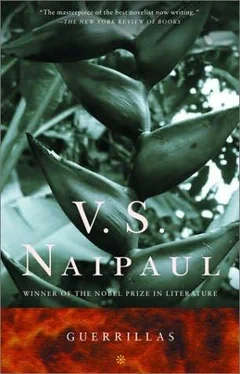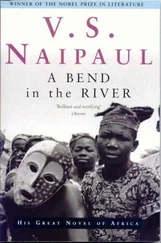V. Naipaul - Guerrillas
Здесь есть возможность читать онлайн «V. Naipaul - Guerrillas» весь текст электронной книги совершенно бесплатно (целиком полную версию без сокращений). В некоторых случаях можно слушать аудио, скачать через торрент в формате fb2 и присутствует краткое содержание. Год выпуска: 1990, ISBN: 1990, Издательство: Vintage, Жанр: Современная проза, на английском языке. Описание произведения, (предисловие) а так же отзывы посетителей доступны на портале библиотеки ЛибКат.
- Название:Guerrillas
- Автор:
- Издательство:Vintage
- Жанр:
- Год:1990
- ISBN:978-0679731740
- Рейтинг книги:5 / 5. Голосов: 1
-
Избранное:Добавить в избранное
- Отзывы:
-
Ваша оценка:
- 100
- 1
- 2
- 3
- 4
- 5
Guerrillas: краткое содержание, описание и аннотация
Предлагаем к чтению аннотацию, описание, краткое содержание или предисловие (зависит от того, что написал сам автор книги «Guerrillas»). Если вы не нашли необходимую информацию о книге — напишите в комментариях, мы постараемся отыскать её.
Guerrillas — читать онлайн бесплатно полную книгу (весь текст) целиком
Ниже представлен текст книги, разбитый по страницам. Система сохранения места последней прочитанной страницы, позволяет с удобством читать онлайн бесплатно книгу «Guerrillas», без необходимости каждый раз заново искать на чём Вы остановились. Поставьте закладку, и сможете в любой момент перейти на страницу, на которой закончили чтение.
Интервал:
Закладка:
The old woman nodded, smiling at Roche. She smoothed her dress over her legs, worked her lips over her teeth and said softly, as though stating a well-known fact, “But they marry their own.”
“I will take the glass from you, Mr. Roche,” Mrs. Stephens said, getting up and moving again between her chair and the morris settee.
He surrendered the wet tumbler, noting as he did so the small flowered pattern on Mrs. Stephens’ dress, the dirtiness on the stomach and the breasts. His right hand was wet and sticky; the smell of chicken dung was strong in his nostrils. When Mrs. Stephens took the tumbler and put it on the enameled tray on the dining table he began to study the gown Lloyd was wearing in the photograph.
“But is black people fault if they allow themselves to be fooled,” Mrs. Stephens said. “But those days finishing fast now. Lloyd was born in the days of bondage. When Knolly was born, Israel was in her glory. Knolly born knowing that. He born knowing that after Israel it was the turn of Africa. No matter what anybody say or do.”
“Israel first,” the old woman said, again as though confirming a well-known fact.
Roche stood up.
Mrs. Stephens said, “You going, Mr. Roche?” She was looking older than when he had come; the rings below her eyes had grown darker; she looked more suffering, exhausted.
“Yes,” he said. “I have to be getting back to the office.”
He began to move toward the frosted-glass door. Heavily, she got up from the chair and followed him. He opened the rickety door himself: the light outside was an assault.
“When you see Knolly, Mr. Roche,” Mrs. Stephens said, “you must tell him to come and look for his mother some time.”
She held the door open while he went down the red concrete steps. She didn’t look at him; her eyes searched the sky and the hillside in an unseeing way. When, from the dirt road, he turned to wave at her he found that she had closed the door again.
The sun beat on his temples; his shirt burned. The dust was thick; he fancied it was penetrating through his socks to his ankles. The bitter saliva thickened nauseously at the back of his mouth. He worked his tongue and cheeks and spat, stickily, into the dust and watched the spit roll into a dust-coated ball. His stomach heaved; the smell of the chicken dung and the tainted dust caught in his nostrils, and he clenched his teeth; but he spat again. He walked briskly downhill, careless of dust and rubble and litter. Two blocks away he saw the black doorway of the bar: he knew that, from there, he was being observed. The boy who had asked him for money was sitting on the steps of the house opposite the car. The boy stayed where he was and stared.
The handle of the car door was hot; and the car, when he sat inside, was suffocating. The seat burned; his mouth again filled with sticky saliva; he felt dust had settled on his face and hands and even below his shirt. He drove carefully, around the obstructions of parked cars and trucks, past the blocked gutters with wrinkled films of white scum. The car cooled down; he began to sweat less.
At last he turned into a broader street, shaded by old samaan trees that grew out of the wide pavement. This was the boundary of the area of small houses and twisting lanes. The houses were bigger here, and many had been turned into offices or commercial colleges. The air was lighter: this street led to the main park. And it was here, some way from the park, in the thin shade of a samaan tree, and against a long white concrete wall hung with a vine known as the bleeding heart — heart-shaped leaves, browned by the drought, heart-shaped flowers the color of blood — it was here that Roche saw two men squatting on the pavement. Not far away, on the left-hand side of the street, an old black car was parked close to the pavement, with its two left-hand doors open over the pavement. Two men were in this car, one in the back, one in the front, both facing the pavement. The man in the back, with one foot in the car and one on the pavement, had a thick, well-trimmed mustache.
Roche thought: Stephens is in real trouble.
ABOUT FIFTEEN minutes later he was in the parking lot of Sablich’s in the center of the city. The elderly mulatto watchman, seated as always in his Windsor chair, smiled at him and, little pipe in his mouth, heavy baton over his thighs, half rose to greet him. The watchman was tall and heavy, with a round face that was too small for his body; his pale brown skin was extraordinarily smooth. He was near retirement, and looked more like a ticket-collector than a watchman. Roche saw the watchman smile, saw him make the effort to rise. But he ignored the watchman; he walked past without looking at him; and he saw the smile turn to a look of surprise.
Upstairs, in the corridor outside his office, he washed his hands in the antique wash basin; the water ran black. It was cool in the office. The jalousies were sealed; the hum of the air conditioners masked the street noises; the afternoon light, coming through strips of glass painted green and falling on the dark oiled floor and pale-green wooden partitions, gave the room a soft green glow.
His sweated shirt dried; he could feel salt and dust adhering to his neck and face. He thought of telephoning Jimmy Ahmed; but he changed his mind. He had telephoned Jimmy before, to find out about Stephens, and Jimmy had been offhand. It was never good, with Jimmy, to be the one who had to get in touch; it was always better to let him make the first move; Jimmy played that little power game.
It was Friday. The day’s work was almost over, and the week’s; and people were beginning to stand around desks in relaxed groups, some of the men with their office towels over their shoulders. He went to the washroom and stripped for a wash: there would be no water on the Ridge until the evening. The washroom was in a renovated part of the building and was not air-conditioned. The concrete walls were white, the windows open; the light dazzled. His face burned again, and he could hear the din of the street. He could hear especially, above the cars, trucks and bicycle bells, the chant of the blind beggar, a youngish man whose legs had been cut off below the hips, who every Friday came to this part of the city. “Help de poor! Help de blind! I am very grateful. Help de blind! Help de poor! I am very t’ankful.” A lusty voice, and the chant never stopped: it was a performance, it had a theatrical, even comic, quality. The beggar knew he was famous.
Roche knew the beggar. But listening now to the persistent cry, not seeing the man, he felt only its strangeness and his own solitude. And out of this there came to him a feeling of apprehension, at first vague and perhaps a little willed, not focused on anything, but which then, as he stood half naked in the sunlit concrete washroom, with its heated sour smell, all at once became overpowering. He was becoming detached from his normal self; his perceptions were being distorted; and he continued to feel that he was willing it. His mood was wrong; and he was sufficiently alert to know that to go outside into that city, in that mood, was to invite physical attack. Drying his face and chest, he thought: I must drive carefully when I leave here. When he went back to the green office he thought again of telephoning Jimmy. But then he thought: I must be careful; I mustn’t become involved.
At four the office closed. Doors banged in various parts of the building, footsteps resounded on wooden floors. Going down to the parking lot, he passed a door that opened into the gallery of the darkened emporium below the main offices. Clerks were doing up bolts of cloth and straightening counters: young men in neat trousers and shirts with nicely knotted ties, men who during working hours gave an impression of great civility, but who came from houses like the one he had visited that afternoon, and whose manners now, after closing time, were already changing. In the parking lot he could hear the roar of the released city: an extra volume of sound around the beggar’s cry, more people, more cars and trucks, shouts, innumerable bicycle bells.
Читать дальшеИнтервал:
Закладка:
Похожие книги на «Guerrillas»
Представляем Вашему вниманию похожие книги на «Guerrillas» списком для выбора. Мы отобрали схожую по названию и смыслу литературу в надежде предоставить читателям больше вариантов отыскать новые, интересные, ещё непрочитанные произведения.
Обсуждение, отзывы о книге «Guerrillas» и просто собственные мнения читателей. Оставьте ваши комментарии, напишите, что Вы думаете о произведении, его смысле или главных героях. Укажите что конкретно понравилось, а что нет, и почему Вы так считаете.












